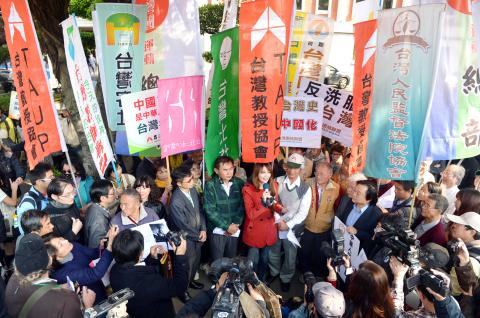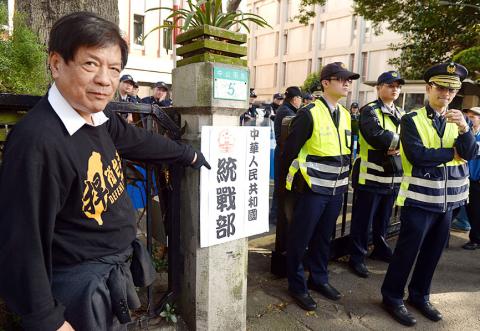Groups yesterday protested the Ministry of Education’s bid to “slightly adjust” the national high-school curriculum, calling the move part of a “brainwashing” policy that would see the new curriculum reflect a more China-oriented perspective.
Despite the groups’ opposition, the ministry later formally approved a new curriculum on Chinese literature and social sciences.
“Taiwanese have fought long and hard to reach a stage where there is much less political influence on our education, so it is therefore unacceptable that the government under the leadership of President Ma Ying-jeou [馬英九] is making an U-turn on this progress,” Jim Lee (李筱峰), a professor at National Taipei University of Education’s Graduate School of Taiwanese Culture, told a rally in front of the ministry in Taipei.

Photo: Wang Yi-sung, Taipei Times
“The so-called ‘slight adjustment’ is not slight at all, it’s a fundamental and dramatic change from a Taiwan-oriented perspective to a China-oriented perspective in education,” Lee added.
Saying that the current curriculum is “too friendly” when it comes to describing the period when Japan controlled Taiwan and unconstitutional when describing China, ministry officials and members of its curriculum outlines adjustment task force have proposed calling the era of Tokyo’s rule the “Japanese colonial period” and referring to “China” as “Mainland China” in textbooks.
They also proposed making adjustments to the description of the period when the nation was under the Chinese Nationalist Party’s (KMT) authoritarian regime.

Photo: Wang Yi-sung, Taipei Times
“I am totally opposed to replacing Taiwan’s perspective for China’s in our nation’s history classes,” National Taipei University student Lai Pin-yu (賴品妤) said. “Taiwanese history can be neither Chinese history, nor KMT history.”
National Taiwan University history professor Chen Tsui-lien (陳翠蓮) criticized the government for making such dramatic changes clandestinely.
“These are major alterations and therefore require more public participation,” she said.
As the groups protested outside the ministry, another group of demonstrators led by the Alliance of Referendum for Taiwan tried to block the entrance to the National Academy for Educational Research (NAER), where the curriculum task force was meeting.
“We’re here to stop the task force from making rash decisions without consulting the public,” alliance convener Tsay Ting-kuei (蔡丁貴) said. “This is such a controversial issue, it should not be decided without having more public discussions — especially when NAER vice president Tzeng Shih-jay [曾世杰] promised us on Friday that he would organize public hearings before making any decisions.”
The protesters briefly stopped some task force members from entering the building, but were removed by police after severe clashes.
The ministry said the changes are based on the 12-year national education system, which is set to be implemented in August, and aimed at achieving better continuity between junior-high and senior-high school textbooks.
After reviewing the curriculum on literature and social sciences, the ministry said it would next review health and physical education.
The Democratic Progressive Party (DPP) condemned the ministry for not halting the initiative.
“The ‘adjustment’ of the curriculum outlines is not an adjustment, but a total overhaul,” DPP spokesperson Xavier Chang (張惇涵) said.
The ministry’s changes “seriously conflict” with most people’s understanding about the nation’s history and geography, Chang said, adding that more than 85 percent of respondents in a DPP opinion poll say that the country’s territory includes Taiwan, Penghu, Kinmen and Matsu, but not “mainland China.”

A Chinese aircraft carrier group entered Japan’s economic waters over the weekend, before exiting to conduct drills involving fighter jets, the Japanese Ministry of Defense said yesterday. The Liaoning aircraft carrier, two missile destroyers and one fast combat supply ship sailed about 300km southwest of Japan’s easternmost island of Minamitori on Saturday, a ministry statement said. It was the first time a Chinese aircraft carrier had entered that part of Japan’s exclusive economic zone (EEZ), a ministry spokesman said. “We think the Chinese military is trying to improve its operational capability and ability to conduct operations in distant areas,” the spokesman said. China’s growing

Nine retired generals from Taiwan, Japan and the US have been invited to participate in a tabletop exercise hosted by the Taipei School of Economics and Political Science Foundation tomorrow and Wednesday that simulates a potential Chinese invasion of Taiwan in 2030, the foundation said yesterday. The five retired Taiwanese generals would include retired admiral Lee Hsi-min (李喜明), joined by retired US Navy admiral Michael Mullen and former chief of staff of the Japan Self-Defense Forces general Shigeru Iwasaki, it said. The simulation aims to offer strategic insights into regional security and peace in the Taiwan Strait, it added. Foundation chair Huang Huang-hsiung

PUBLIC WARNING: The two students had been tricked into going to Hong Kong for a ‘high-paying’ job, which sent them to a scam center in Cambodia Police warned the public not to trust job advertisements touting high pay abroad following the return of two college students over the weekend who had been trafficked and forced to work at a cyberscam center in Cambodia. The two victims, surnamed Lee (李), 18, and Lin (林), 19, were interviewed by police after landing in Taiwan on Saturday. Taichung’s Chingshui Police Precinct said in a statement yesterday that the two students are good friends, and Lin had suspended her studies after seeing the ad promising good pay to work in Hong Kong. Lee’s grandfather on Thursday reported to police that Lee had sent

BUILDUP: US General Dan Caine said Chinese military maneuvers are not routine exercises, but instead are ‘rehearsals for a forced unification’ with Taiwan China poses an increasingly aggressive threat to the US and deterring Beijing is the Pentagon’s top regional priority amid its rapid military buildup and invasion drills near Taiwan, US Secretary of Defense Pete Hegseth said on Tuesday. “Our pacing threat is communist China,” Hegseth told the US House of Representatives Appropriations Subcommittee on Defense during an oversight hearing with US General Dan Caine, chairman of the Joint Chiefs of Staff. “Beijing is preparing for war in the Indo-Pacific as part of its broader strategy to dominate that region and then the world,” Hegseth said, adding that if it succeeds, it could derail